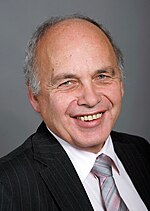
The Federal Council is the federal cabinet of the Swiss Confederation. Its seven members also serve as the collective head of state and government of Switzerland. Since after World War II, the Federal Council is by convention a permanent grand coalition government composed of representatives of the country's major parties and language regions.
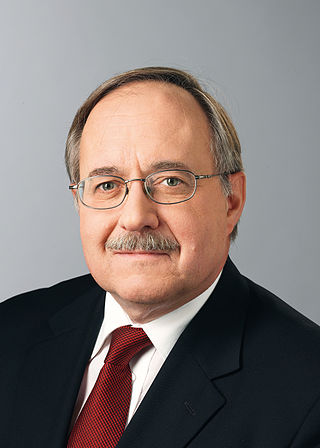
Samuel Schmid is a Swiss politician who served as a Member of the Swiss Federal Council from 2000 to 2008. He was the head of the Federal Department of Defence, Civil Protection and Sports.

Christoph Wolfram Blocher is a Swiss industrialist and politician who served as a Member of the Swiss Federal Council from 2004 to 2007. A member of the Swiss People's Party (SVP/UDC), he headed the Federal Department of Justice and Police. As an industrialist, he became wealthy as CEO and majority shareholder in the EMS-Chemie corporation, now run by his daughter, Magdalena Martullo-Blocher.

The Swiss People's Party, also known as the Democratic Union of the Centre, is a national conservative and right-wing populist political party in Switzerland. Chaired by Marcel Dettling, it is the largest party in the Federal Assembly, with 62 members of the National Council and 6 of the Council of States.

In Swiss politics, the magic formula is an arithmetic formula for dividing the seven executive seats on the Federal Council among the four coalition parties. The formula was first applied in 1959. It gave the Free Democratic Party, the Catholic Conservative Party and the Social Democratic Party two seats each, while the Party of Farmers, Traders and Independents received one seat.
On December 12, 2007, all seven members of the Federal Council, the government of Switzerland, were elected by the joint chambers of the Federal Assembly for the 2008–2012 term of office. Councillors are elected individually by an absolute majority of votes, with the incumbent councillors defending their seats in descending order of seniority.

Eveline Widmer-Schlumpf is a Swiss politician and lawyer who served as a Member of the Swiss Federal Council from 2008 to 2015. A member of the Swiss People's Party (SVP/UDC) until 2008, she was then a member of the splinter Conservative Democratic Party (BDP/PBD) until 2021, when that party merged into The Centre. Widmer-Schlumpf was the head of the Federal Department of Justice and Police from 2008 to 2010, when she became head of the Federal Department of Finance. She served as President of the Swiss Confederation in 2012.

The Conservative Democratic Party of Switzerland was a conservative political party in Switzerland from 2008 to 2020. After the 2019 federal election, the BDP had three members in the National Council.
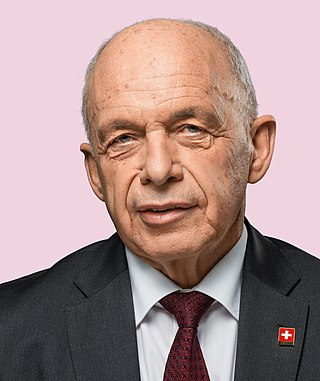
Ulrich "Ueli" Maurer is a Swiss politician who served as a Member of the Swiss Federal Council from 2009 to 2022. A member of the Swiss People's Party (SVP/UDC), he was President of the Swiss Confederation in 2013 and 2019. Formerly head of the Federal Department of Defence, Civil Protection and Sports (2009–2015), Maurer has headed the Federal Department of Finance from 2016 to 2022. From 2019 to 2022, he was the longest-serving sitting member of the Federal Council.
A by-election to the Swiss Federal Council was held in Switzerland on 16 September 2009, after incumbent Federal Councillor Pascal Couchepin announced his intention to retire on 31 October 2009.
Two by-elections to the Swiss Federal Council were held in Switzerland on 22 September 2010, after federal councillors Moritz Leuenberger (SP) and Hans-Rudolf Merz announced they would step down from the Federal Council towards the end of the year. The by-elections resulted in the elections of Simonetta Sommaruga from the SP and Johann Schneider-Ammann from the FDP, resulting in no change in the partisan composition of the council. It also resulted in the first majority of women on the Federal Council in its history, with Sommaruga joining Micheline Calmy-Rey, Doris Leuthard and Eveline Widmer-Schlumpf.
An election for all seven members of the Federal Council, the government of Switzerland, was held on 14 December 2011, following the federal election on 23 October 2011. Micheline Calmy-Rey announced she would not run for re-election to the council. According to a traditional informal convention, the successor has to come from the French-speaking or Italian-speaking part of Switzerland. The candidates for her post announced by their respective cantonal sections are Alain Berset (Fribourg), Pierre-Yves Maillard (Vaud), Stéphane Rossini (Valais), and Marina Carobbio (Ticino).
Elections were held to the Council of States of Switzerland in October and November 2007 as part of the 2007 federal election. All 46 members of the Council of States were elected from all cantons of Switzerland. The first round was held on 21 October. In eight cantons, not all seats were filled in the first round, and a second round was held on 11 November, 18 November, or 25 November.

Martin Landolt is a Swiss politician and member of the Swiss National Council for the Conservative Democratic Party of Switzerland (BDP). From May 2012 to December 2020, he served as the President of the BDP.
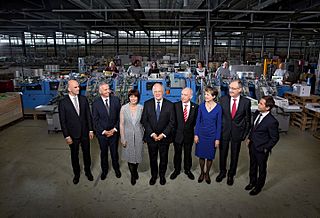
An election for all seven members of the Federal Council, the Government of Switzerland, was held on 9 December 2015, following the federal election on 19 October 2015, for the 2016–2020 term.
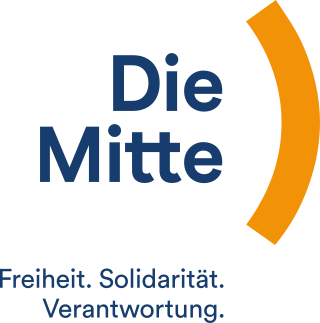
The Centre is a centre/centre-right political party in Switzerland. It was formed through the merger of the Christian Democratic People's Party of Switzerland (CVP/PDC) and the Conservative Democratic Party of Switzerland (BDP/PBD). Following the formal merger of the parties on 1 January 2021, it has 29 of 200 seats in the National Council and 15 of 46 seats in the Council of States. Viola Amherd is the party's representative on the Federal Council.
An election for all seven members of the Federal Council, the Government of Switzerland, was held on 11 December 2019, following the federal election on 20 October 2019, for the 2020–2024 term.
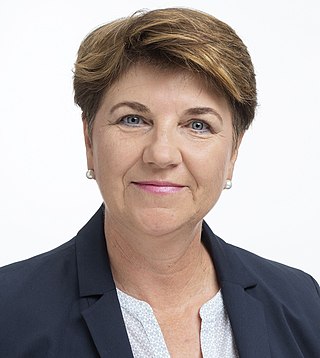
By-elections to the Swiss Federal Council were held on 5 December 2018, after federal councillors Johann Schneider-Ammann (FDP-BE) and Doris Leuthard (CVP-AG) announced in September they would leave the Council effective 31 December of the same year.

By-elections to the Swiss Federal Council were held on 7 December 2022, after federal councillors Ueli Maurer (SVP-ZH) and Simonetta Sommaruga (SP-BE) announced they would leave the Council effective 31 December of the same year. The parliament elected Albert Rösti and Élisabeth Baume-Schneider respectively to replace them.

